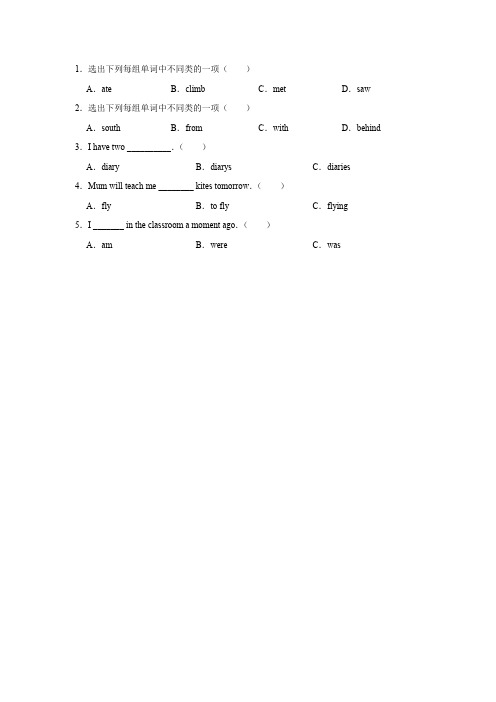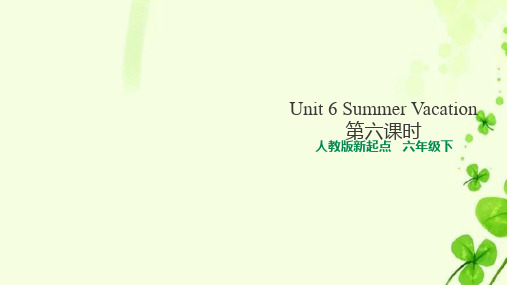Unit6 Summer vacation
人教版六年级英语下册 Unit 6 summer vacation-5课后练习题 含答案

1.选出下列每组单词中不同类的一项()A.ate B.climb C.met D.saw 2.选出下列每组单词中不同类的一项()A.south B.from C.with D.behind 3.I have two __________.()A.diary B.diarys C.diaries 4.Mum will teach me ________ kites tomorrow.()A.fly B.to fly C.flying5.I _______ in the classroom a moment ago.()A.am B.were C.was参考答案与试题解析1.选出下列每组单词中不同类的一项()A.ate B.climb C.met D.saw【分析】A.ate吃;B.climb爬;C.met见面;D.saw看到.【解答】考查类别分类.A.ate吃;B.climb爬;C.met见面;D.saw看到.ate、met 和saw是动词过去式,climb是动词原形.故选:B.【点评】考查类别分类,要求熟悉课本所学词汇,掌握词义词类,结合要求,辨析选项,确定答案,完成题目.2.选出下列每组单词中不同类的一项()A.south B.from C.with D.behind【分析】A.south南方;B.from来自;C.with和…一起;D.behind在…后面.【解答】本题考查词性分类.A.south南方;B.from来自;C.with和…一起;D.behind 在…后面.from、with和behind是介词,south是名词.故选:A.【点评】注意区分介词和名词.学习中注意加强对英语词汇的理解与记忆.3.I have two __________.()A.diary B.diarys C.diaries【分析】我有两本日记.【解答】答案:C,考查可数名词单复数.两本日记,diary应当改成它的复数形式,diary 是以辅音加y结尾,因此应当改y为i再加es.故选:C。
六年级下册Unit 6 summer vacation 教学课件

bought
souvenirs, tea, silk, toys, food, art projects, …
swam in the sea, took pictures, made new friends, rode horses, played on the beach, …
ate
drunk
delicious food, tea, coke,
Talking about photos!
ate
drunk
delicious food, tea, coke,
fruits, seafood, coconut juice,
saw icecream,
milk tea,
the sun rise, popcorn, …
…
beautiful flowers/lakes/… Monkeys/pandas, flower shows, …
新起点英语六年级下册
Unit 6 Summer Vacation Lesson 3
What is Bill’s family doing? What can you see in the pictures?
hours 6
train plane
How far is Sichuan from Beijing? It’s three hours by plane from Beijing.
新起点英语六年级下册
Unit 6 Summer Vacation Lesson 2
What did Ted buy for his cousin? He bought a small panda for his mum.
How much was it? It was 150 yuan.
六年级下册英语导学案-Unit 6 Summer Vacation Lesson 1∣人教(新起点)

六年级下册英语导学案-Unit 6 Summer Vacation Lesson 1∣人教(新起点)一、教学目标1.能听懂并会读出本课时的重点单词和短语:beach, swim, sunbathe, climb mountains, camp, go sailing。
2.能询问和回答关于假期活动的问题。
3.能口头表达自己的暑假计划。
二、教学内容本课程主要内容是假期活动及暑期计划。
1. 词汇•beach: 沙滩•swim: 游泳•sunbathe: 晒太阳•climb mountains: 爬山•camp: 露营•go sailing: 去划船2. 句子•What are you going to do this summer vacation?(你暑假打算做什么?)•I’m going to the beach.(我要去沙滩。
)•Are you going to swim in the sea?(你要在海里游泳吗?)•Yes, I am.(是的,我要。
)3. 文章Read and WriteHi, my name is Lucy. I’m going to have a great summer vacation.I’m going to visit my grandma in Florida. We are going to the beach. We are going to swim and sunbathe. We are also going to climb mountains. We love to climb the mountains in Alaska. We are not going to camp this year. We are going to go sailing instead.What are you going to do this summer vacation? Write and tell me.三、教学活动1. 朗读和默读在本节课的第一部分,老师带着学生朗读和默读本课中的单词。
人教版六年级英语下册 Unit 6 summer vacation-3课后练习题 含答案

1.They are going there ________ May 10.()A.with B.in C.on2.They live ____ the UK.()A.on B.in C.at3.I went _________ a holiday.()A.to B.on C.with4.I took Ted ________ a restaurant ________ taste different kinds of food.()A.for,to B.to,to C.to,for 5.Tom is ________ famous than Ted.()A.much B.very C.more参考答案与试题解析1.They are going there ________ May 10.()A.with B.in C.on【分析】他们打算五月十日去那里.【解答】本题考查介词用法.在某一天用on,on May 10.故选:C.【点评】掌握常用介词用法,并理清句子意思和结构.2.They live ____ the UK.()A.on B.in C.at【分析】他们居住在英国.【解答】考查地点介词.根据题干"They live﹣﹣﹣the UK"可知句意是"他们居住在英国".live in(居住)是固定搭配.故选:B.【点评】正确区分每个介词的用法,根据固定搭配和习惯用语.注意积累词汇,多多练习.3.I went _________ a holiday.()A.to B.on C.with【分析】我去度假了.【解答】答案:B.考查介词固定搭配,go on a holiday去度假,固定搭配,A.to去,到,B.on在…上,C.with与,和,故选B.【点评】go to把去某个地方,后面加地点名词,go on a holiday去度假,固定搭配,go with和…谁去,进行区别,分析.4.I took Ted ________ a restaurant ________ taste different kinds of food.()A.for,to B.to,to C.to,for【分析】我带着Ted到了一家餐馆品尝不同类的食品.【解答】考查介词辨析.for为了;to向;take sb to somewhere to do sth,意思是带某人到某处做某事.故选:B.【点评】熟练掌握各个介词的意义及用法,然后结合句子信息选出正确答案.5.Tom is ________ famous than Ted.()A.much B.very C.more【分析】汤姆比Ted更有名.【解答】考查形容词比较级.根据Tom is ________ famous than Ted,可知这里than用于比较级形式,famous的比较级加more.故选:C.【点评】形容词比较级考查,要求熟悉形容词比较级的用法与变化规律,分析题干,抓住句意,结合句子分析选项,确定答案,完成题目.。
人教版(新起点)英语六年级下册:unit 6《summer vacation》单元教学目标

Unit6 单元教学目标【内容来源】人民教育出版社(一起点)六年级下册Unit6语言技能目标第一层次:1. 通过听、说、读、写等形式的语言活动,帮助学生复习前几册所学话题的重点词汇和功能句,引导学生综合运用所学语言知识和技能进行交流。
2. 引导学生就所听或所读内容与他人展开对话交流。
3. 引导学生仿照阅读文段,按相应的提示或要求写几个意义连贯的句子。
本单元各课所复习知识点列表第二层次:引导学生借助图片和其他阅读策略读懂Story Time的小故事,根据故事内容回答相关问题,并能尝试复述小故事。
其他目标1. 引导学生积极参与课堂上的各种活动或游戏,并与同伴合作完成活动或游戏。
2. 引导学生在活动中认真倾听同伴发言,并尝试表达自己的观点。
Lesson1Lesson2Lesson3【教学反思】牛郎织女学习目标:1.了解民间故事幻想奇丽、情节动人的特点。
2.初步学会阅读、分析和复述民间故事,注意叙述语言的正确运用。
3.把握课文的故事情节。
把握人物性格。
4. 感受我国古代劳动人民的勤劳善良和对美好自由幸福生活的向往。
【重点难点】1、重点:了解民间故事的特点,学会阅读、分析、复述民间故事。
2、难点:对本文中神话手法的理解。
相关链接:1.了解民间故事及特点:民间故事是一种立足于现实而又富有幻想的口头文学作品,由于它反映劳动人民的要求和愿望,所以就广泛地流传在人民群众之中。
[&^%*~]特点:一般有完整的故事情节,鲜明的人物性格,语言口语化,富有浓郁的生活气息和地方色彩。
2.走近作者。
[^*&@~]这个故事的作者是谁呢?叶圣陶,又名叶绍钧,江苏省苏州人,着名作家,教育家,叶圣陶的童话集《稻草人》和《古代英雄的石像》在我国现代儿童发展史上具有重要的意义。
3.我国古代的四大民间故事是什么呢?《孟姜女哭长城》、《梁山伯与祝英台》、《白蛇传》《牛郎织女》[@~%*#]4.板书设计:教学流程:一.兴趣导入:1.我们中国历史悠久,文化灿烂,传统节日就是历史文化的最好载体,同学们,你所知道的传统节日有哪些呢?(春节元宵节清明节端午节七夕节中秋节重阳节冬至节腊八节)其实,每一个传统节日背后都有一段动人的故事,今天,我们就来了解一下中国最具浪漫色彩的传统节日——七夕节背后的壮美而动人的故事——《牛郎织女》的故事。
六年级下册英语教案-Unit 6 Summer Vacation Lesson 1∣人教(新起点)

六年级下册英语教案-Unit 6 Summer Vacation Lesson 1∣人教(新起点)一、教学目标1.能够听懂、会说并能正确使用本课时的单词和短语(例如summer vacation, swim, surf, play beach volleyball)。
2.能够熟练地朗读本课文并能模仿优美的语音语调,提高英语口语表达水平。
3.能够理解和使用本课时的语法结构,如:What did you do on your summer vacation? I swam/surfed/played beach volleyball.4.能够通过本课时的任务和活动,培养学生的合作意识和团队协作能力,提高学生的信息获取和运用能力。
二、教学重点难点重点1.听力技能的培养,提高学生对生词和短语的理解能力。
2.句型What did you do on your summer vacation?及其回答的语法结构的理解和运用。
难点1.对生词和短语的掌握和运用。
2.What did you do on your summer vacation问句及其回答的语音语调和语气的模仿。
三、教学过程1. 导入(5分钟)教师展示一些海滩度假的照片,让学生看一看,并引导学生谈谈他们对夏令营的印象。
然后输入本课时的主题,介绍一下本课时所学习的短语和单词。
2. 学习新单词和短语(10分钟)出示新单词和短语(例如summer vacation, swim, surf, play beach volleyball),通过图片和示范教学法帮助学生理解并掌握这些单词和短语。
3. 听力训练(15分钟)1.教师播放音频,让学生跟读并模仿其语音和语调。
2.教师播放音频,让学生听一听一个人谈论他的暑假假期,然后一起回答问题,帮助学生理解需要掌握的语言点What did you do on your summer vacation?及其回答的语法结构。
人教版新起点六年级下册英语Unit 6 Summer Vacation stoty time 课件

Let's read
Let's get some fruit from the magic tree.
Let's read They wanted to find the tree, but the snail was too slow to go. 他们想找树,但是蜗牛爬的太慢了。 The lion had a problem with his throat and could not speak. 狮子嗓子有问题不能说话。 He couldn't ask directions. 他们没办法问路。 They agreed to go together. 他们同意一起走。
Practice
True or False
( T )The snail wanted to eat some fruit from the tree. ( F )The snail had a problem with his throat. ( T )The elephant is 40 kilometres from the tree. ( T )The buzzard is nice. ( F )The snail could run as fast as the lion.
Let's read
We're looking for the magic tree. How can we get there?
You need to travel forty more kilometres north.
Let's read
They went on walking north. 他们向北走。 In the evening, they met a zebra. 晚上,他们遇到一匹斑马。
人教版六年级英语下册 Unit 6 summer vacation-10课后练习题含答案

1.He comes from Canada. (对划线部分提问)2.Alice learns to dance three times a week. (对划线部分提问)?3.英译汉What kinds of animals did you see at Animal World yesterday?4.英译汉Elephants have long noses,big ears and short tails.5.英译汉They are hungry when they wake up in the spring.参考答案与试题解析1.He comes from Canada. (对划线部分提问)Where does he come from?【分析】他来自加拿大。
他来自哪里?【解答】考查特殊疑问句。
特殊疑问句的结构:特殊疑问词+一般疑问句。
句子的划线部分是Canada,是地点,询问哪,确定疑问词为Where,句子的剩余部分变成一般疑问句跟在后面,句子中有谓语动词的第三人称单数comes,变一般疑问句用助动词does引导,comes变为come。
用Where does he come from?提问。
故答案为:Where does he come from?【点评】特殊疑问句即用来对句子某一特定部分进行提问的句子。
通常以疑问词开头。
做此类题,先确定划线部分的内容是什么,然后用相应的疑问词进行提问。
2.Alice learns to dance three times a week. (对划线部分提问)How often does Alice learn to dance?【分析】爱丽丝一周学跳三次舞。
爱丽丝多久学一次舞?【解答】考查特殊疑问句。
特殊疑问句的结构:特殊疑问词+一般疑问句。
句子的划线部分是three times a week,是频率,询问多久一次,确定疑问词为How often,句子的剩余部分变成一般疑问句跟在后面,句子中有谓语动词的第三人称单数learns,变一般疑问句用助动词does引导,learns变为learn。
- 1、下载文档前请自行甄别文档内容的完整性,平台不提供额外的编辑、内容补充、找答案等附加服务。
- 2、"仅部分预览"的文档,不可在线预览部分如存在完整性等问题,可反馈申请退款(可完整预览的文档不适用该条件!)。
- 3、如文档侵犯您的权益,请联系客服反馈,我们会尽快为您处理(人工客服工作时间:9:00-18:30)。
A: Hi! Where did you go on your summer vacation last year?
B: I went to …... I … and I …
1. Read the dialog Section A .
3. Talk with your partner about your summer
People
1. Mei Ling
2. Pam 3. Sandy
Places
went to Canada went to her uncle’s house stayed home
Second ---listening. (听第二遍) Answer the questions.(回答问题)
1.Where did Mei Ling go on her summer vacation Last year? How did she go?
vacation.
Everyday English
All work and no play makes Jack a dull boy.
(只学习不会玩耍,聪明的孩子要变傻。)
Sandy: Where did you go on your summer vacation last year? Mei Ling: I went to my uncle’s house. He lives on an island . I went by boat. Pam: Did you have a good time? Mei Ling: Yes, I did. I ate a lot of fish and swam in the sea. I took a lot of pictures, too. How about you? Pam: I stayed home and helped my parents in the shop. Sandy: I went to Canada . I studied English this summer. Mei Ling: Wow! Last summer vacation was good. What are you going to do this year?
Unit 6 Summer Vacation
Lesson1 Dialogs/Vocabulary (First period)
Brainstorming (头脑风暴)
Where did you go on your summer vacation last year?
What did you do? How was it?
a mountain
an island
a big city
a small town
a
b
c d 1. had a picnic d _
d
c 2. took some pictures __ a 3. did some shopping __ 4. swam in the sea __ b
First ---listening. (听第一遍) Where did Mei Ling, Sandy, and Pam go on summer vacation? Match the person with the place .(连线)
3.Where did Sandy go on her summer vacation Last year? What did she do?
She went to Canada. She studied English.
Third ---listening. (听第三遍) Fill in the blanks in the conversation.(补全对话) Sandy: Where did you go on your summer vacation last year? Mei Ling: I went to my uncle’s house. He lives on an island . I went by boat. Pam: Did you have a good time? Mei Ling: Yes, I did. I ate a lot of fish and swam in the sea. I took a lot of pictures, too. How about you? Pam: I stayed home and helped my parents in the shop. Sandy: I went to Canada . I studied English this summer. Mei Ling: Wow! Last summer vacation was good. What are you going to do this year?
She went to her uncle’s house. She went by boat.
2.Where did Pam go on her summer vacation last year? What did she do?
She stayed home. She helped her parents in the shop.
